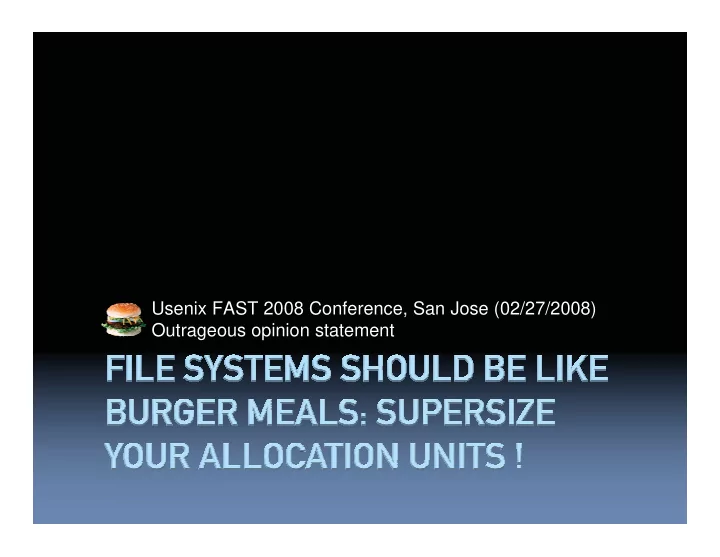

Usenix FAST 2008 Conference, San Jose (02/27/2008) Outrageous opinion statement
• Name: Konstantin Koll • Age: 29 • Origin: University of Dortmund, Germany • Occupation: PhD student � Topic: file systems � Created a high-performant relational file system (in a nutshell, a working clone of Microsoft WinFS) � During development, performance problems occured (one of them due to small allocation units)
• Only full units can be allocated to a file, leading to wasted memory at the end • Large allocation units � large waste • FAT file system got booted for clusters of 32 KB • Tools exist to resize allocation units:
• File system designers (you !) favor small allocation units to minimize wasted memory • This is irresponsible ! • To make obvious why, let´s introduce the »BAU« (i.e. the size of a burger meal)
• To reduce waste of food, let´s use small BAUs:
• Benefit: � No waste, because only the required amount of food is being purchased by customers
• Benefit: � No waste, because only the required amount of food is being purchased by customers • Downsides: � Slow performance of food intake (customers have to go to the counter all the time) � High administrative overhead (during production, wrapping and delivery) � Small allocation units are pointless (food is cheap, so wasting some is irrelevant)
• Benefit: � No waste, because only the required amount of memory is being used by files
• Benefit: � No waste, because only the required amount of memory is being used by files • Downsides: � Slow performance of I/O operations (cannot use burst reads for many continous sectors) � High administrative overhead (during file access) � Small allocation units are pointless (memory is cheap, so wasting some is irrelevant)
• Study of actual user data (two examples): � Size of allocation units (X) vs wasted memory (Y) � Waste does not grow proportional to cluster size !
• Supersize your allocation units !
Recommend
More recommend